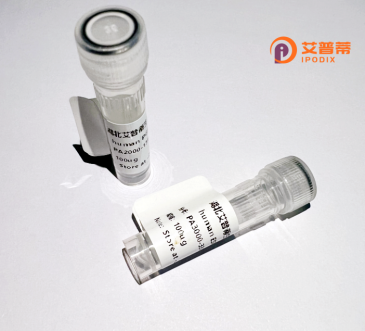
| 纯度 | >90%SDS-PAGE. |
| 种属 | Human |
| 靶点 | PIPSL |
| Uniprot No | A2A3N6 |
| 内毒素 | < 0.01EU/μg |
| 表达宿主 | E.coli |
| 表达区间 | 1-862 aa |
| 活性数据 | MASEVPYASGMPIKKIGHRSVDSSGGTTSSALKGAIQLGITHTVGSLSTKPESDVLMQDFHMVESIFFPSEGSNLTPAHHYNAFRFKTYAPVAFRYFWELFGIRPDDYLYSLCSEPLIELCSSGASGSLFYVSSDDEFIVKTVRHKEAEFLQKLLPGYYINLNQNPRTLLPKFYGLYCVQTGGKNIRIVVMNNLLPRSVKMHIKYDLKGSTYRRRASQKEREKPLPTFKDLDFLQDIPDGLFLDADVHNALCKTLQRDCLVLQSFKIMDYSLLMSIHNIDHAQREPLSSETQYSVDTRRPAPQKALYSTAMESIQGEARRGGTMETDDHMGGIPARNSKGERLLLYIGIIDILQSYRFVKKLEHSWKALIHDGDTVSVHRPGFYAEWFQRFMCNTVFKKIPLKPSPSKKLRSGSSFSQRAGSSGNSCITYKPLVSGEHKAQVTTKAEVEPGVHLGCPDVLPQTPPLEEISEGSPTPDPSFSPLVEETLQMLTTSVDNSEYMGNGDFLPTRLQAQQDAVNTVCHSKTRSNPENNVGLITLDNDCEVLTTLTPDTGRILSKLHTVQPKGKITFCMGIHVAHLALKHRQGNNHKIRIIAFVGNPVEDNEKNLVKLAKCLKKEKVNVDIINFGEEEVNTEKLTAFVNTLNGKDGTGSHLVTVPPGPSLADALISFPILAGEGGAMMGLGASDFEFGVDPSADPELALVLRVFMEEQRQRQEEEARQAAAASAAEAGIATTGTEDSDDALLKMTISQQEFGHTGLPDLSSMTEEEKIVCAMQMSLQGAEFGLAESADIDASSAMDTSEPAKEEDDYDVMQDPEFLQSVLENLPGVDPNNEAIRNAVGSLASQATKDSKKDKKEEDEK |
| 分子量 | 121.4 kDa |
| 蛋白标签 | GST-tag at N-terminal |
| 缓冲液 | PBS, pH7.4, containing 0.01% SKL, 1mM DTT, 5% Trehalose and Proclin300. |
| 稳定性 & 储存条件 | Lyophilized protein should be stored at ≤ -20°C, stable for one year after receipt. Reconstituted protein solution can be stored at 2-8°C for 2-7 days. Aliquots of reconstituted samples are stable at ≤ -20°C for 3 months. |
| 复溶 | Always centrifuge tubes before opening.Do not mix by vortex or pipetting. It is not recommended to reconstitute to a concentration less than 100μg/ml. Dissolve the lyophilized protein in distilled water. Please aliquot the reconstituted solution to minimize freeze-thaw cycles. |
关于重组人PIPSL(或PSIP1/LEDGF)蛋白的研究相对较少,可能存在名称拼写或简称差异。以下是3篇相关文献的概括(注:若名称不准确,需进一步核实):
---
1. **文献名称**: "LEDGF/p75 is essential for nuclear and chromosomal targeting of HIV-1 integrase in human cells"
**作者**: Llano M, et al. (2006)
**摘要**: 研究发现重组人LEDGF/p75蛋白(即PSIP1蛋白,可能与PIPSL为同一家族)是HIV-1整合酶与宿主染色体的关键结合因子,参与病毒DNA整合机制,揭示了其在HIV感染中的关键作用。
2. **文献名称**: "The interaction of LEDGF/p75 with integrase is lentivirus-specific and promotes DNA integration"
**作者**: Cherepanov P, et al. (2005)
**摘要**: 该文献详细描述了LEDGF/p75与HIV整合酶的相互作用机制,并通过重组蛋白实验验证其增强病毒DNA整合效率的功能,为抗病毒药物靶点提供依据。
3. **文献名称**: "Structural basis for the recognition of HIV-1 integrase by the LEDGF/p75 cofactor"
**作者**: Hare S, et al. (2009)
**摘要**: 通过X射线晶体学解析了重组LEDGF/p75蛋白与HIV整合酶的复合物结构,揭示了二者结合界面的关键氨基酸残基,为设计抑制HIV复制的小分子提供结构基础。
---
**说明**:
1. PIPSL可能为“PSIP1/LEDGF”或类似蛋白的简称,以上文献聚焦其与HIV整合酶的相互作用;
2. 若目标蛋白并非HIV相关,可能需要重新确认名称或扩大检索范围。建议补充蛋白全称或功能描述以获取更准确文献。
Recombinant human PIPSL protein is a chimeric protein resulting from the fusion of two distinct genes, PIP5K1A (Phosphatidylinositol-4-Phosphate 5-Kinase Type 1 Alpha) and PLSCR1 (Phospholipid Scramblase 1), originally identified in certain cancer cells. This fusion arises from chromosomal translocations, commonly observed in renal cell carcinomas and other malignancies, leading to the production of a hybrid mRNA transcript. The PIPSL protein retains functional domains from both parent proteins: the kinase domain of PIP5K1A, which generates phosphatidylinositol-4.5-bisphosphate (PIP2), and the lipid scramblase activity of PLSCR1. involved in phospholipid redistribution across membranes.
Studies suggest PIPSL may play roles in dysregulated cellular signaling, membrane trafficking, and cytoskeletal dynamics, potentially contributing to oncogenic processes. Its recombinant form is engineered using expression systems (e.g., bacterial or mammalian cells) for functional characterization, enabling researchers to explore its biochemical properties, interaction networks, and pathological relevance. Research on PIPSL sheds light on the molecular mechanisms of gene fusion-driven cancers and may guide therapeutic strategies targeting chimeric proteins. However, its physiological functions in normal cells remain poorly understood, warranting further investigation into its dual enzymatic activities and regulatory pathways.
×